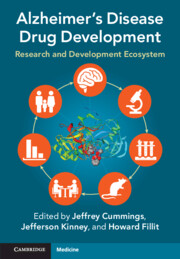Book contents
- Alzheimer’s Disease Drug Development
- Alzheimer’s Disease Drug Development
- Copyright page
- Dedication
- Contents
- Contributors
- Foreword
- Acknowledgments
- Section 1 Advancing Alzheimer’s Disease Therapies in a Collaborative Science Ecosystem
- Section 2 Non-clinical Assessment of Alzheimer’s Disease Candidate Drugs
- Section 3 Alzheimer’s Disease Clinical Trials
- 11 Phase 1 Trials in Alzheimer’s Disease Drug Development
- 12 The Importance of Phase 2 in Drug Development for Alzheimer’s Disease
- 13 Alzheimer’s Disease Drug Development in Pharmaceutical Companies
- 14 Trial Site Infrastructure and Management: Importance to Alzheimer’s Disease Drug Development
- 15 ATRI and ACTC: Academic Programs to Accelerate Alzheimer’s Disease Drug Development
- 16 The European Prevention of Alzheimer’s Disease Program: A Public–Private Partnership to Facilitate the Secondary Prevention of Alzheimer’s Disease Dementia
- 17 The Global Alzheimer’s Platform Foundation®: Delivering New Medicines Faster by Accelerating Clinical Trials
- 18 Clinical Trial Development in Frontotemporal Lobar Degeneration
- 19 Statistical Considerations in the Design and Analysis of Alzheimer’s Disease Clinical Trials
- 20 Alzheimer’s Disease Trial Recruitment and Diversifying Trial Populations
- 21 The Role of Online Registries in Accelerating Alzheimer’s Disease Drug Development
- 22 Data Safety Monitoring Boards in Alzheimer’s Disease Trials
- 23 Globalization of Alzheimer’s Disease Clinical Trials
- 24 The Use and Development of Clinical Measures of Alzheimer’s Disease Trials
- 25 Tele-Trials, Remote Monitoring, and Trial Technology for Alzheimer’s Disease Clinical Trials
- 26 Expanded Access and Compassionate Use in Alzheimer’s Disease Drug Development
- 27 The Role of the Contract Research Organization in Alzheimer’s Disease: The Vital Link in the Clinical Drug-Development Program
- 28 The Role of Regulatory Agencies in Alzheimer’s Disease Drug Development
- 29 Alzheimer’s Disease Clinical Trial Study Partners
- 30 From Trials to Practice: Are We Ready for a Disease-Modifying Treatment?
- 31 Best Practices for Clinical Trials during COVID-19
- Section 4 Imaging and Biomarker Development in Alzheimer’s Disease Drug Discovery
- Section 5 Academic Drug-Development Programs
- Section 6 Public–Private Partnerships in Alzheimer’s Disease Drug Development
- Section 7 Funding and Financing Alzheimer’s Disease Drug Development
- Index
- References
30 - From Trials to Practice: Are We Ready for a Disease-Modifying Treatment?
from Section 3 - Alzheimer’s Disease Clinical Trials
Published online by Cambridge University Press: 03 March 2022
- Alzheimer’s Disease Drug Development
- Alzheimer’s Disease Drug Development
- Copyright page
- Dedication
- Contents
- Contributors
- Foreword
- Acknowledgments
- Section 1 Advancing Alzheimer’s Disease Therapies in a Collaborative Science Ecosystem
- Section 2 Non-clinical Assessment of Alzheimer’s Disease Candidate Drugs
- Section 3 Alzheimer’s Disease Clinical Trials
- 11 Phase 1 Trials in Alzheimer’s Disease Drug Development
- 12 The Importance of Phase 2 in Drug Development for Alzheimer’s Disease
- 13 Alzheimer’s Disease Drug Development in Pharmaceutical Companies
- 14 Trial Site Infrastructure and Management: Importance to Alzheimer’s Disease Drug Development
- 15 ATRI and ACTC: Academic Programs to Accelerate Alzheimer’s Disease Drug Development
- 16 The European Prevention of Alzheimer’s Disease Program: A Public–Private Partnership to Facilitate the Secondary Prevention of Alzheimer’s Disease Dementia
- 17 The Global Alzheimer’s Platform Foundation®: Delivering New Medicines Faster by Accelerating Clinical Trials
- 18 Clinical Trial Development in Frontotemporal Lobar Degeneration
- 19 Statistical Considerations in the Design and Analysis of Alzheimer’s Disease Clinical Trials
- 20 Alzheimer’s Disease Trial Recruitment and Diversifying Trial Populations
- 21 The Role of Online Registries in Accelerating Alzheimer’s Disease Drug Development
- 22 Data Safety Monitoring Boards in Alzheimer’s Disease Trials
- 23 Globalization of Alzheimer’s Disease Clinical Trials
- 24 The Use and Development of Clinical Measures of Alzheimer’s Disease Trials
- 25 Tele-Trials, Remote Monitoring, and Trial Technology for Alzheimer’s Disease Clinical Trials
- 26 Expanded Access and Compassionate Use in Alzheimer’s Disease Drug Development
- 27 The Role of the Contract Research Organization in Alzheimer’s Disease: The Vital Link in the Clinical Drug-Development Program
- 28 The Role of Regulatory Agencies in Alzheimer’s Disease Drug Development
- 29 Alzheimer’s Disease Clinical Trial Study Partners
- 30 From Trials to Practice: Are We Ready for a Disease-Modifying Treatment?
- 31 Best Practices for Clinical Trials during COVID-19
- Section 4 Imaging and Biomarker Development in Alzheimer’s Disease Drug Discovery
- Section 5 Academic Drug-Development Programs
- Section 6 Public–Private Partnerships in Alzheimer’s Disease Drug Development
- Section 7 Funding and Financing Alzheimer’s Disease Drug Development
- Index
- References
Summary
The chapter explores whether high-income countries are ready for the first disease-modifying Alzheimer’s disease (AD) treatment, approved in the USA in February 2021. It looks at the capacity to provide diagnostic services relative to the expected demand, institutional preparedness, and potential solutions to overcome capacity constraints. Wait times are projected to differ substantially. Initial average wait times range from 5 months in Germany to 28 months in Canada. In France, Canada, and Taiwan, we project it will take over a decade to clear the backlog of prevalent cases and to make a treatment accessible with little delay, because of scarcity of dementia specialists, and aggravated by the lack of financial and structural plannin. Potential solutions include broadening the dementia workforce by integration of primary care clinicians and other specialists, care models that leverage specialist time, and telecare-supported models. Better diagnostic technology to detect cognitive decline and the AD pathology in primary care settings and predictive models to triage patients show potential to improve access.
Keywords
- Type
- Chapter
- Information
- Alzheimer's Disease Drug DevelopmentResearch and Development Ecosystem, pp. 343 - 353Publisher: Cambridge University PressPrint publication year: 2022
References
- 1
- Cited by

